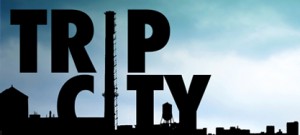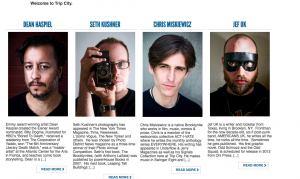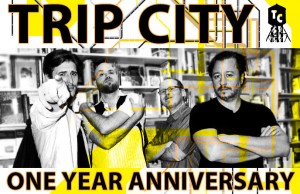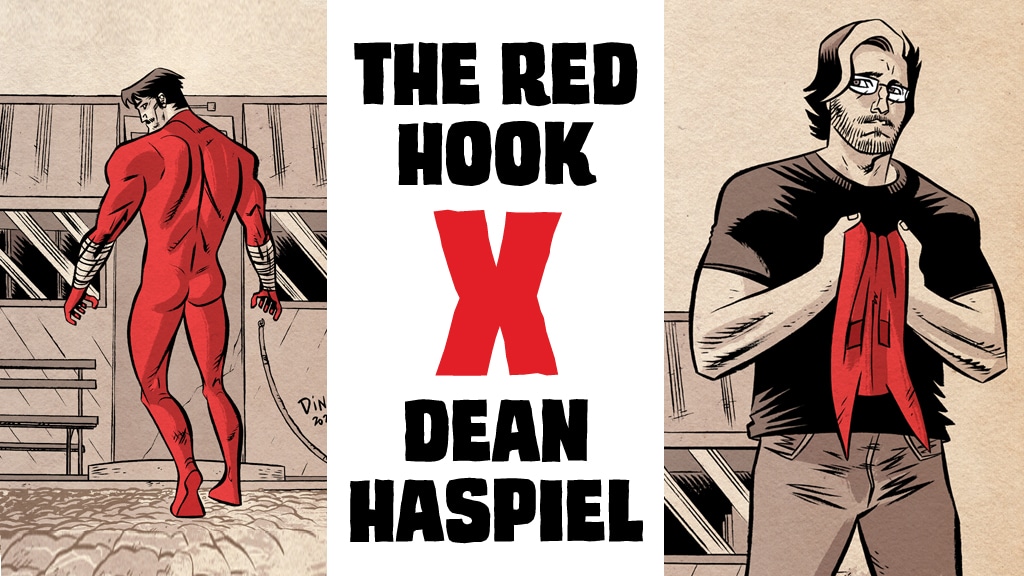Disclaimer: this journalist is one of the newest additions to the TRIP CITY collective. When I first heard the name TRIP CITY, since I have lyrical turn of mind, it fired my imagination. A digital city? What might that entail? When I first visited the TRIP CITY website, I found what seemed to be a professional art salon made up of impressive talent provided by a stolid team of seasoned creators who had something significant to say in their respective fields. This was a place for their professional aspirations to play, unfettered. The site had a spare, clean aspect that seemed somehow different from anything I had seen before. Then it dawned on me: there was no advertizing cluttering the screen, no pop-up ads blocking the content I was trying to read or investigate. It seemed almost like a digital download for that reason, an e-book speaking directly to me. But it was also all available for free at the click of a button.
Then there was the ease of navigation and the interesting avenues of interrelationship between the aspects of TRIP CITY’s content. It was highly visual in its layout, with slide-show blocks of recently added articles visible and tiled individual articles ready for selection below. It felt like a digital comic with panels to choose from, each taking you into a separate, related world. Or you could follow the “map” navigation with categories that were both simple and intriguing, from “creators” to “blog”, “comix”, “podcasts”, “TV” and “sounds”. The categories were multisensory. Comics seemed to be a common, recurring theme despite the wide array of art forms present.
The description on the homepage was disarming. TRIP CITY was a “Brooklyn-Filtered Literary Arts Salon”. I understood each word, but didn’t have a mental bracket to interpret the collective phrase. In fact, the site defined the term. That’s what happens when something entirely new is brought into existence. If you’ve never seen something like it before, you interpret it in sections and parts, relating each to things you can break down for comparison. Of course I’d seen web platforms for comics, and even for creative writing, but no, I hadn’t seen this combination before. And not with this degree of arts-focused clarity. Another word I noticed coming up in the description of the origins and goals of the site was “community”, a community formed by a “fellowship of 21st century auteurs” and including the readers in that collective.
The “creators” page gave me the impression that within this community, individuality was still firmly established and highly valued. These were paradoxes that were difficult to take in all at once: a professional, highly functioning digital platform without any distracting ads, a collective that specifically underlined the role of individuality. Then there was the content. Just delving into a couple of the features that week back in the springtime of my first TRIP CITY encounter impressed me, then impressed me again, and again. The quality of the material seemed to set the bar higher with each installment. If you’re familiar with TRIP CITY, these may all seem like foregone conclusions, but I was hit with the full brunt of the strangeness of this alien site. The contributors were highly skilled and accomplished in their fields, and had published and interacted in other media outlets. That was something that seemed a little bizarre to me. These were not unknowns trying to hype their first comic or single. They had CHOSEN to be here at TRIP CITY and that made me very curious. I wanted to know why, and more about what they hoped to accomplish. It took me the rest of TRIP CITY’s first year to get my answers from the creators themselves and hear some of the rationale behind why comics, in particular, are the “glue” that holds the multi-arts site together.
In a series of Beat-exclusive interviews this week, I’m going to bring you answers about how TRIP CITY came about, what it’s learned, and where it’s going, from TRIP CITY’s four founding members and curators: Dean Haspiel (BILLY DOGMA), Seth Kushner (CulturePOP, SCHMUCK), Chris Miskiewicz (EVERYWHERE) and Jeffrey Burandt (AMERICANS UK). These interviews coincide with a retrospective feel at TRIP CITY as its contributors celebrate its groundbreaking first year anniversary and look forward toward the site’s second year of trend-setting existence.
TRIP CITY’s full press release regarding its first anniversary can be found here, including a line-up of new material. New features this this year will range from comics to podcasts and TV episodes, including work by Eric Skillman, Noah Van Sciver, Matthew Rosenberg, Patrick Kindlon, Laura Lee Gullege, and Natalie Kim and George O’Connor of InkedTV. Here are a few highlights from the release:
TRIP CITY CELEBRATES ONE-YEAR ANNIVERSARY
The goal of TRIP CITY was to create an online community where artists can independently showcase their most personal, creator-owned, signature works. 21st Century auteurs contributing include; Joe Infurnari (MUSH! Sled Dogs with Issues, Marathon), Jennifer Hayden (Underwire), Nick Abadzis (Laika), Jen Ferguson (Art in Chaos), Ron Scalzo (Bald Freak Music), Sandra Beasley (Don’t Kill the Birthday Girl, I Was The Jukebox), Dan Goldman (Shooting War, Red Light Properties), Jeff Newelt (Heeb Magazine, The Pekar Project), Jonathan Vankin (The World’s Greatest Conspiracies), Amy Finkel (Furever), Kevin Colden (Fishtown), Vito Delsante (FCHS), Amanda Ferguson (HBO’s Luck) and Hannah Means-Shannon (The Beat).
During its first year, TRIP CITY showcased regular free content including Haspiel’s essay/prose series Room Tone and his comic The Last Romantic Antihero, Kushner’s comic Schmuck, his photocomix profile series CulturePOP, Burandt’s single-panel series Time Bum and Clash Fiction essays, Miskiewicz’s essay series Signals, Infurnari’s comic Time Fucker, Hayden’s comic strip S’Crapbook, Abadzis’ single panel Subterranean Stories, Beasley’s prose series Modern Alice, DelSante’s crime prose Steel City Noir, and the TRIP CITY Podcast, which has included such notable guests as; Michael Moore, Henry Rollins, Miranda July, Jonathan Lethem, Bob Fingerman, Becky Cloonan, Lizz Winstead, Chuck Klosterman, Daniel Johnston, and more.
Hannah Means-Shannon writes and blogs about comics for TRIP CITY and Sequart.org and is currently working on books about Neil Gaiman and Alan Moore for Sequart. She is @hannahmenzies on Twitter and hannahmenziesblog on WordPress.

















Denise McDonald Dorman liked this on Facebook.
Dave Kruku liked this on Facebook.
Comments are closed.